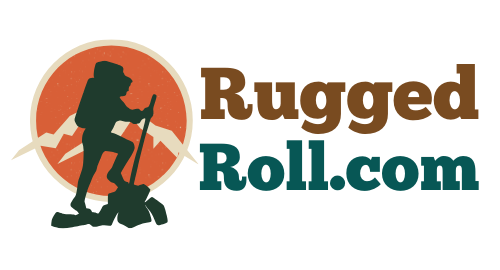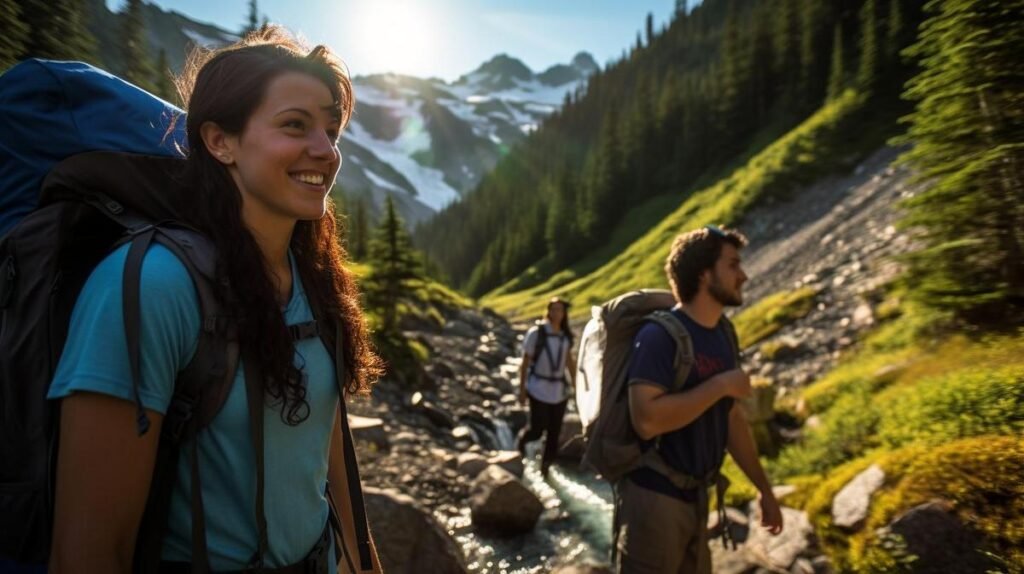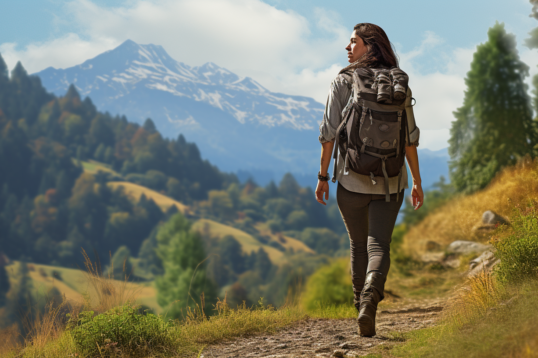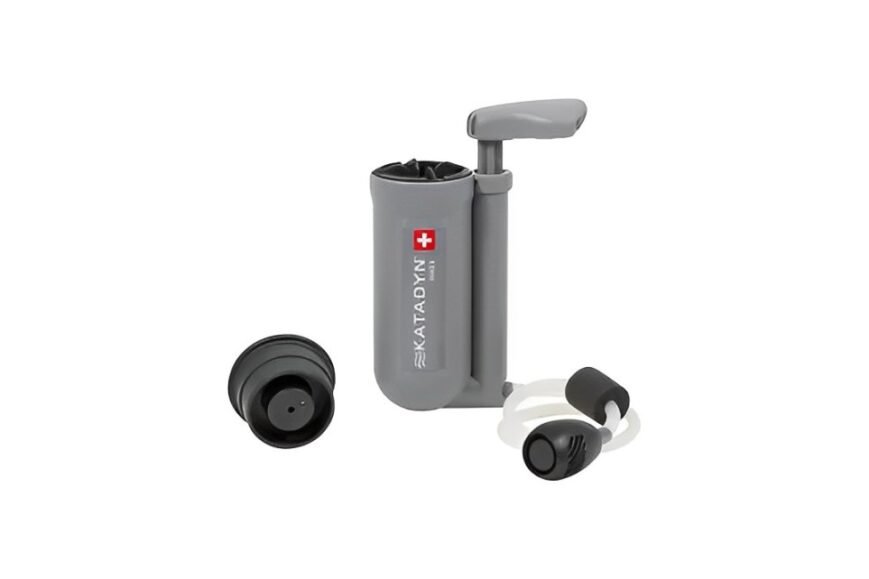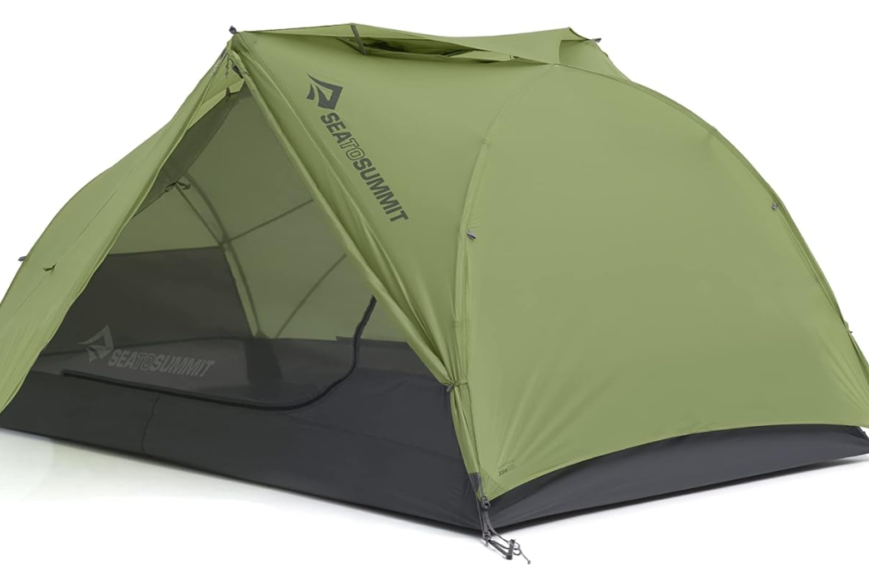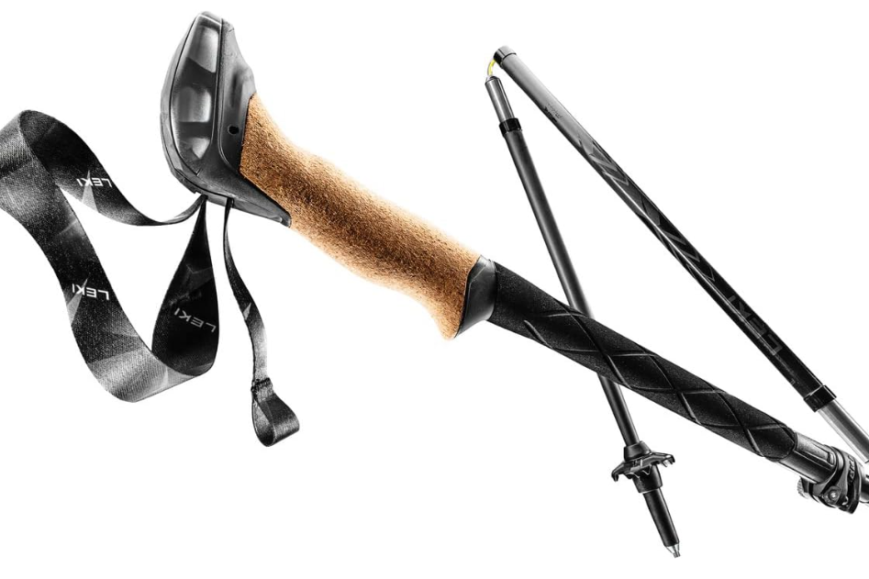- Beginners should start with easy trails that suit their fitness level and check weather conditions.
- Essential hiking gear includes: a comfortable backpack, water, snacks, a map, sturdy boots, and for day hikes, a daypack with a first-aid kit, extra clothing, and a phone.
- Locate nearby easy trails using apps, websites, or local hiking groups, and start with short hikes (1-3 miles).
- Safety tips: leave no trace, know your limits, choose the right trail, watch the weather, bring a map and compass, and learn how to interact safely with wildlife.
- Planning your first hike includes picking an easy trail, using apps and online resources, joining hiking groups, and packing the right gear.
- Health benefits of hiking include improved physical fitness, better heart health, reduced stress, and mental well-being.
- Physical preparation for hiking should focus on walking, balancing, and planning, with exercises like squats, lunges, and jogging included in the routine.
- Trail navigation and safety skills include learning to read maps and signs, understanding trail ratings, and knowing how to use a first aid kit.
Ready to hit the trails, but not sure where to start? Fresh air awaits! Hiking is a great adventure, and I’m here to guide you, step by step. We’ll break it down: what gear you need, where to find easy trails, and how to stay safe. Keep it simple and fun – let’s get ready for your first hike with confidence!
How Do Beginners Start Hiking?
How do beginners start hiking? First, learn about trails and what to expect.
To begin, pick an easy trail that fits your fitness level. Look for paths with clear signs and not too long. Starting small lets you test your limits safely. Be sure to check the weather before heading out so you don’t get caught in the rain or worse.
Next, know what to bring on your hike. Water, snacks, and a map are key. Don’t carry too much. A heavy bag makes hiking harder. Wear good boots to protect your feet from rocks and roots.
Remember to tell someone where you’re going. This way, if something goes wrong, help can find you. Now, you can start your hiking adventure with confidence. Remember, the goal is to enjoy nature, not race to the end. Take your time, look around, and breathe in the fresh air. Welcome to the world of hiking!
What Should Be on a Beginner’s Hiking Gear Checklist?
The essentials for your gear checklist are a backpack, water, snacks, and a map. First, get a backpack to hold everything. It should be comfy and fit just right. You need water to stay hydrated, even on short hikes. Pack snacks for energy. They could be nuts or energy bars. Don’t forget a map. Even simple trails need one. The map keeps you on track.
Now, let’s talk boots. Good boots are a must. They should be sturdy, support your ankles, and have a solid grip. When trying them on, make sure they feel good. Don’t buy them if they pinch or rub. Breaking in your boots is key. Wear them on short walks before you hit the trails.
And for day hikes? A daypack is all you need. Pack a first-aid kit, extra clothes, and rain gear, just in case. Your phone is good for photos and in emergencies. Again, water is super important. And always let someone know your plan. This way, help can find you if you need it.
For those crafting a tailored gear list, remember the basics but add personal items too. Maybe you need a hat or sunscreen. Maybe you have medicine to bring. Think about your needs. Every hiker is different.
So, start with this list. As you hike more, you’ll learn what works best for you. Every trip helps you get better at packing what you need.
What Are Some Easy Hiking Trails Near Me?
To find easy hiking trails near you, check local parks or online resources. Start with short distances and simple paths meant for new hikers. Look out for trails labeled as “easy” or “beginner-friendly”. This helps you match the trail with your skill level.
Ask yourself, “Hiking for beginners near me, where do I start?” Your local area might surprise you with hidden gems. Use apps or websites that focus on outdoor activities to find nearby trails. Local hiking groups are a big help too. People in these groups share experiences and suggest the best spots for starters.
“How long should a beginner hike be?” Start with short routes, such as ones that take less than an hour. Gradually build up to longer hikes as you gain strength and confidence. Begin with a target of 1 to 3 miles. This is a safe distance that won’t push you too hard.
Finding local hiking groups is as valuable as finding the trail itself. They offer advice and might even host group hikes for beginners. Join one near you to meet fellow hikers. They’ll give you tips on the best beginner-friendly hiking destinations.
When you look for beginner-friendly hiking destinations, think about the scenery too. A beautiful view makes your hike more enjoyable. Start with nature reserves or state parks. They often have well-maintained trails perfect for beginners.
Remember, the best way to start is to take it slow. Pick a trail that’s right for your level and enjoy your time outside. Happy hiking!

How Can I Ensure Safety on My First Hike?
The #1 etiquette rule when hiking is to leave no trace. This means you should keep nature as you found it so others can enjoy it too. Always pack out your trash, stay on marked trails, and respect wildlife. For first hikes, safety is key. Let’s dive into what you need to know to stay safe out on the trails.
Begin with the basics. Know your limits and choose a trail that matches your fitness level. Always look at the weather before you head out. It can change fast, and you want to be ready. If you see dark clouds forming, it may be safer to turn back.
It’s also important to know how to find your way. Bring a map and a compass and know how to use them. These tools don’t need batteries and could save you if your phone loses power.
You will likely run into animals. If you do, stay calm. Do not try to touch or feed them. Always look at them from afar. If they get too close, make noise or clap to scare them away.
Your adventure in nature is all about being smart and safe. With these tips, you can make your first hike a great one!
What Is the Best Way to Plan Your First Hike?
How do beginners start hiking? Start small and plan. To plan your first hike, pick an easy trail. Look for trails close to home. Use apps and maps to find them. Join hiking groups for beginners. They offer good advice and partners to hike with. Make a checklist for your hike to stay safe and have fun.
Apps and maps are key tools for trail finding. They show the path, length, and difficulty. Go online or use your phone. This makes finding the best trail for you easy. Look for trails labeled “easy” or “for beginners”.
Hiking groups can be a big help. They plan group hikes that you can join. This is a great way to learn and meet other hikers. Many towns have groups just for people new to hiking.
Your checklist should have water, food, and a first aid kit. You also need good shoes, a map, and a phone. Check the weather before you go. Tell someone where you’re going and when you’ll return. Good planning makes your first hike safe and fun.
What Are the Health Benefits of Hiking for Beginners?
Starting hiking offers many health perks. You get stronger, your heart health improves, and you cut stress.
- Physical health benefits of starting hiking
Hiking is great exercise. It helps your heart and lungs work better. You can hike to stay fit and shed pounds.
- Mental well-being and emotional perks of regular hiking
Hiking can make you feel happy. It reduces stress and can ease mild depression. Walking in nature can simply clear your mind.
- Keeping a hiking journal: why and how to start
Jot down your hiking adventures. This can help you see your progress. You will find joy in your hiking journey.
- Engaging with nature and local conservation efforts through hiking
By hiking, you care for nature. You learn about trees, animals, and trails. You can join groups to help the earth.
Every step on a trail means growth – for body and soul. Pack your bag, lace your boots, and step into nature’s gym.
How Should Beginners Approach Physical Preparation for Hiking?
What are the 3 basic skills in hiking? They are walking, balancing, and planning. Begin training these skills with simple hikes that progress in difficulty.
To start your physical prep, you might want to look at hiking workouts for starters. These are exercises crafted to boost your hiking ability. Think about your legs, heart, and lungs when picking workouts. This focus will help you hike longer and climb higher without getting too tired.
Next, gear up with conditioning exercises for beginners. Good choices include squats, lunges, and step-ups. These moves target leg muscles you’ll use on the trails. Plus, they enhance your balance which is key for uneven ground.

Don’t forget about attaining peak physical fitness for hiking. Hiking paths can be tough. Jog a little each day. This builds your stamina so you can hike longer. Toss in some hill climbs to mimic hiking uphill.
Lastly, consider post-hike recovery tips. After hiking, it’s vital to cool down. Stretch your muscles to avoid stiffness. Drink water and eat healthy food to refuel.
Remember, take things slow. Ramp up your workouts as your body gets stronger. Listen to your body and give it rest when it needs it. And, remember to always stay hydrated and well-fed; this helps more than you might think. Soon, you’ll be hitting the trails with confidence and strength.
How Can Beginners Learn About Trail Navigation and Safety?
What are the 3 basic skills in hiking? You need to know how to:
- Navigate trails
- Read trail ratings
- Use a first-aid kit
Now, let’s dive into the details.
When you hike, you must stay on track. This means you need to learn navigation basics for hiking. A good place to start is to understand your trail map before you head out. Look for clear signs on the track. Check for color-coded paths. They guide you through the hike. Learn to read a compass. It can help you find your way in nature.
Next up, let’s talk ratings. Trails can be easy, medium, or hard. Understanding trail difficulty ratings keeps you safe. It means you only pick hikes that match your skill level. Start with easy routes. Work your way up as you get better.
You should always pack a first aid kit. Hiking first aid essentials include bandages, antiseptic wipes, and blister plasters. Learn how to use these before you hike. You can practice at home. Knowing first aid can make a big difference if you or a friend gets hurt.
Remember, safety always comes first. Read up, gear up, and hike with care. Happy trails!
Conclusion
In this post, we explored how to kick off your hiking adventure. Start by picking the right trail and setting smart goals. Make key gear your buddy. Trusty boots, a good pack, and key gear set you up for success. Find easy trails to get your feet wet and hike the right length for you. Remember to stay safe, learn the basics, and pack smart for changes. Plan well for a smooth first hike, and know the health perks will boost your body and mind. Workouts prep you up and post-hike tips keep you fit. Learn navigation and safety to feel ready. Go hit the trails and have fun!
![]()
